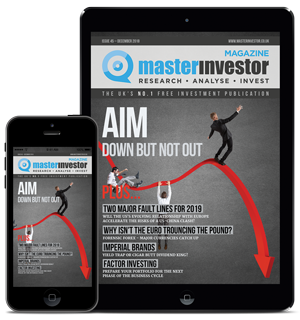Mellon on the Markets: Thoughts for 2019


Never miss an issue of Master Investor Magazine – sign-up now for free! |
Readers of a certain vintage will be familiar with the Joni Mitchell lament, “The Circle Game”, where the painted ponies go round and round at an ever-faster rate, until the game starts again. In other words, the rider expires. So it is with time. It goes faster and faster as we get older, and in my case, I can’t believe how fast this year has gone.
I don’t feel I have done nearly enough to justify the 350+ days that have passed – and as a result, I am getting myself one of those big year planners where I am going to clearly set out my objectives for next year.
Amongst them is the completion and publication of an updated version of Juvenescence, where not only is the science catching up with the aspiration of ultra-long lives, but the science has now outstripped a fair bit of the first edition.
A second new year resolution is to become thoroughly reacquainted with emerging markets, where the world’s fastest growth lies and where values are being laid bare by another dismal year of underperformance. It strikes me that laying down some of the emerging markets might be a good strategy for the next five years or so.
Brexit brings bargains
In addition, all this boring Brexit talk is leading to what will – with another 10 per cent or so – be great buying opportunities in UK Real Estate Investment Trusts (REITs) (see Robert Stephens’ piece on page xx) and other property vehicles. I have picked up some Capital & Counties (LON:CAPC) and Intu (LON:INTU) recently as a start, but the really microscopic look will occur in the early period of 2019.
As for Brexit, Mrs May is certainly resilient, in the sense of unwavering. (Whether that is sensible or not, I have no idea.) Personally, I like the Nick Boles idea of a Norway solution and would even go for a second referendum, albeit whether that resolves anything is a moot point. Leave could well win. The pound, only modestly weaker, is signallinga low probability of a crash-out Brexit, and I agree with that.
But British shares, at about 11x earnings, are generally cheap and it might be worth picking some up in anticipation of a Brexit deal, poor thought it may be.
In the event that the UK ends up staying in the EU, might I suggest, in a tongue in cheek way, that we become rule breakers rather than rule takers, and just stay and cause trouble. After all, France has just blown through its budget deficit, and Italy’s laughable 2.4 per cent target is about as accurate as a Comintern forecast back in the day.
Slowing growth exposes fault-lines
But there is no doubt that the world economy is slowing; China for sure, Europe to a crawl, and the US showing signs of moderate cracking. This is not surprising given the weight of debt (world debt is up by a factor of 3 in the last twenty years) and the wind-down of easy money. It is worth noting the following: US gross national debt rose by $1.33 trillion over the past 12 months to $21.8 trillion. Critically, China’s holdings of Treasuries fell $50 billion to $1.14 trillion while Japan’s fell by $76 billion to $1.02 trillion.

Never miss an issue of Master Investor Magazine – sign-up now for free! |
Selling of US Treasury bonds is likely to continue as China’s current account surplus is down to 0.38% of GDP on its way to nothing, and Japan’s trade balance has been moving further into deficit most of this year. This means that the support for US treasuries – at a time when the Fed is shrinking its balance sheet, will be diminished. This points to higher yields, especially at a time when the fiscal deficit is ballooning. This is a very difficult time for the Fed to judge what to do; seemingly, the US economy is doing well, but beneath the surface there are cracks the size of the San Andreas fault.
I continue to like gold and silver, because, despite the fact that commodities are down sharply over the past month or so, they have been resilient, and even modestly bullish.
The yield pull-back in the US in the last few weeks probably represents another opportunity to sell US bonds, as inflation seems to be bubbling up there, on close examination of the facts.
Likewise, euro bonds represent extremely poor value, even though negative yields seem to have been consigned largely to history. And Japanese bonds are surely now one of the great shorts in history. And gilts are crazily priced.
But opportunities remain…
Apart from the UK (where dividend yields are nudging 5%), Japan remains interesting with more or less everything going for it, apart from poor demographics. It has positive earnings momentum, improving corporate governance (pace Nissan (TYO:7201), which looks like a stich up) and a weak currency (a nap for 2019) which enhances export earnings.
In terms of stocks, starting with the conservative picks first, I like Lloyds (LON:LLOY) as it is priced almost at distress levels when in fact it is a dividend producing machine; and I like GSK (LON:GSK) and Novartis (SWX:NOVN), as well as Gilead (NASDAQ:GILD), in the pharma/biotech space. All three are cheap.
Any major Chinese ETF will do, but more locally I favour Carrs Group (LON:CARR) on AIM, and RestorBio (NASDAQ:TORC) and Unity Biotechnology (NASDAQ:UBX) in the US, both at the forefront of longevity research.
In gold, I remain a director, shareholder and stalwart supporter of Condor Gold (LON:CNR), listed on AIM, and a shareholder in Venturex (ASX:VXR) and Zenith Minerals (ASX:ZNC) in Australia, both of which I like.
In the US, stay well away from the FAANGs in general – and watch out for individual companies ripe for a fall. A good example closer to home is ASOS (LON:ASC). For so long levitated by who knows what, and in one day, as I write, down by 40%.
Dare I say it, this could happen to any one of the FAANGs on a light stumble. In fact, I will wager that it WILL happen!

Never miss an issue of Master Investor Magazine – sign-up now for free! |
So, we head into another year of uncertainty – Italy will be the fracture point in Europe, the trade war is not resolved, interest rates are rising in many places and while fiscal policy remains accommodative, monetary policy is not.
That is not a recipe for strong markets, and indeed, most look overstretched at best and overpriced in the case of the US.
In summary, in terms of strategy for 2019, I’m looking at the UK in a modest way, sterling versus the dollar, yen against the dollar, Japan, short bonds everywhere and a smattering of China and general EM. Gold and silver will be brighter next year and are showing signs of a breakout.
There is little likelihood of a strong year overall in 2019, and therefore we need to focus on the pockets of opportunity that undoubtedly are being uncovered by recent market falls. But, remember the old adage that in a bear market – and, surely, we are now in one – the good girls tend to go down with the bad, so be very selective.
Anyway, have a Happy Christmas and a wonderful New Year.
Happy Hunting!
Jim Mellon
Mr Mellon, would you recommend holding physical gold and silver?
I suspect many Master Investor readers, like me, invest primarily in investment trusts and funds, and are unfamiliar with currency trading and how to short bonds. It would really help if Jim Mellon could suggest, as Filipe R Costa often does, some suitable ETFs that can be purchased via UK-based trading platforms.
Given Jim Mellon’s interests in biotech, how about Illumina, the dominant manufacturer of gene sequencing machines?
Whichever publication I read there is a positive narrative on Lloyd’s bank shares but still their share price is rock bottom. Clearly there are no real buyers in the market which means the market mood is expecting a downturn in their profits in 2019 which is odd given the burden of PPI claims is lifted in 8 months time . Even Woodford has sold out in his equity fund . Only time will tell.
What do you think about no deal brexit and joining on WTO rules. The tariffs are not as burdensome as many think. UK has substantial income that is generated from abroad so the pound can only fall by a limited amount theoretically, also taking into account it is already priced low. Plus them amount of rich people abroad looking to buy UK assets such as houses will diminish the rout. Long term it can be great for the economy.